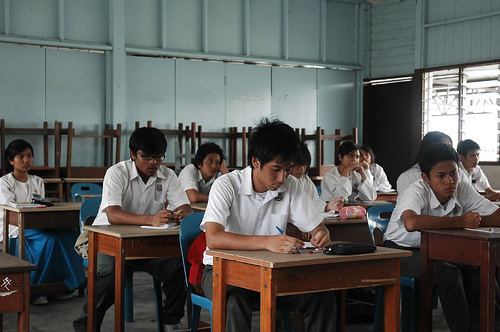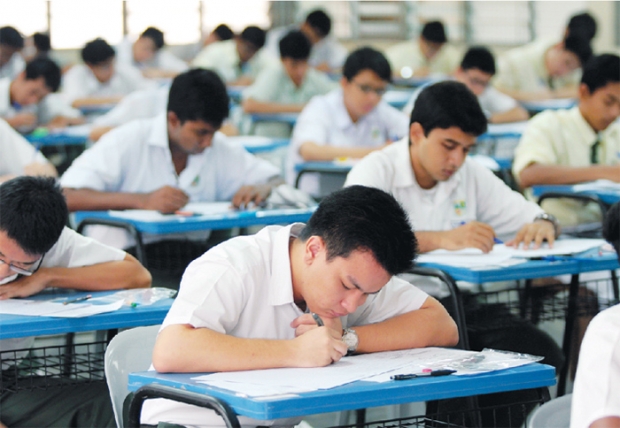Kampung School Teacher Says His Students Have The English Proficiency Of 4-Year-Olds
Yet another passionate Malaysian teacher is determined to battle the horrible state of the local education system.
As we edge closer to our vision of becoming a first world nation that constitutes having world class infrastructures and an advanced society, there is a single, major blunder that is left unaddressed; our education system
Malaysians are probably a little tired of hearing about how saddening the local education system is. From complains of loopholes in the syllabus, how the system is dividing and all the way to having incompetent teachers running the system.
Most Malaysians have gone through 11 years of the public school system and are completely aware of the fact that on the whole, it did very little to help us truly grasp and learn new pieces of information.
Instead it was a little over a decade of just memorising bits of information, that are sometimes not even accurate, in order for us to collect the highest number of As from every single test we take in school.
Of course, some of us had the luxury of being taught by sincere, passionate teachers that made us what we are today. They were the ones that were interested in educating us, making the best out of the little resources they were given to teach and going the extra mile to ensure that each student in a class truly understood a subject, with no discrimination.
Making matters worse, even after all these years, the education ministry has failed to bridge the widening gap of knowledge between the rural and urban students, leaving us with a single uniform syllabus and students with contrasting level of capabilities
It is understandable that each student has different IQ levels and capacity to understand a subject, but it is the education system's responsibility to ensure that each student is given the best guidance and opportunity to fully explore their potential.
The dilemma with our education system is that, it has failed to do that by forsaking the school children in rural areas with very different upbringings and surroundings.
Unlike kids in urban areas that have the accessibility to tuition centers, mass media and most often, educated parents to guide them, rural children can only rely on their teachers and what the education system has in store for them.
Despite the fact that a great deal of inspiring local students are still making it big and chasing their dreams under really difficult conditions,we can't deny that the education system needs a revamp, one that involves increasing its quality and standards.
Joseph Tan, a secondary school teacher, recently brought to light the worrying standards of students from rural areas that have failed to grasp the local education syllabus due to a lack of proficiency in the English language
Joseph, detailed his disappointing experience of marking the examination papers of his Form 4 students in a rural school, in his Facebook post, dated 15 November, Sunday.
His post spoke about how he has spent the whole year teaching his students ways of "cheating the system" to get at least some marks in their tests and exams.
"A whole year’s effort, down the drain. I’d taught them again and again, how to simply copy points to get marks and ways to “cheat” the system in an effort to get at least a few marks for a test which is 11 years too advanced for their level," read the post by Joseph.
"They didn’t need to understand what was before them, they just needed to COPY parts of the questions. Then, I felt like an idiot, wasting my time marking papers that were impossible to do for my students," lamented Joseph.
The image that accompanied Joseph's status that reads, "ap pon tau' (I know it, too)
Image via Joseph Tan/FacebookThe young school teacher apparently gave his students specific instructions on how to how to score marks in their tests with simple instructions on what to copy in order for them to get at least 20 marks out of the full 155 marks in a single paper.
Eventually he was met with the realisation that his 16-year-old, Form 4 students "barely have the English proficiency of four-year-olds" and that in itself is prove that the questions would be impossible for them to answer.
"What a joke, our national education system is," commented Joseph.
Which leads us to the question; Are we studying to learn and expand our knowledge or to just get the highest grade?
Students of a school in Kuala Lumpur showing their SPM results, earlier this year
Image via The Malaysian Insider"I remembered that when I was their age, I hated sejarah and moral so much and absolutely refused to study for those subjects and even follow the teachers’ tips to get “free marks”. I had given up even trying to do the tests. I had given up on those subjects," recalled Joseph.
It usually takes us completing our school years to fully realise the importance of actually learning new things to educate and enlighten our minds instead of merely joining in the rat race that involves memorising facts to collect A's.
Without forsaking the importance of paper qualification, it is completely possible to enrich the education system to ensure that school students are taught to fully understand a concept or subject instead of pushing them to basically turn into a photocopy machine that forgets the information the moment they complete their exams.
Eventually, Joseph realised, that the lives and backgrounds of his students is actually the reason behind their lack of interest in the cookie cutter system that harshly judges and demotivates then
"...and then I remembered where my students were coming from. Kampung school, kampung life, virtually NOBODY to practice English with, bad parents, bad teachers, bad school administration, bad childhood education, bad discipline, bad cultural and community influence, poor financial background, divorced parents, and the list goes on...," read the Facebook status.
"Being pushed through a system that forced them to do tests which were too hard for them, being scolded for being “stupid”, being labelled as “F”ailures in every exam, sitting in examination halls and sleeping for two and a half hours because the words in front of them don’t make any sense...all for TEN years of schooling.
"They had given up on education," added John.
Not accepted in schools and losing interest in the system that constantly ignores them, the young students end up turning to mindless, negative activities that leads to some of them even dropping out of schools in the long run
Illegal cigarettes in Kota Kinabalu, Sabah are so cheap that even young children can afford it
Image via Sixth Seal"So they turn to other things to escape from their shitty reality: monkeying around in classes, ponteng (skipping) class, ponteng school, smoking, wandering around aimlessly on their motorbikes without driving licenses, going on “convoys” with their “members”, doing menial low-paying jobs, and some of them, dropping out of school," said Joseph.
Despite all these 'activities' that the students get involved in, Joseph thinks that it is still very difficult to point fingers and pin the blame on the students because of the harsh factors that usually drives them to turn out that way.
"You can’t COMPLETELY free a child from blame when they have stolen something ESPECIALLY when they KNOW it’s wrong. They KNOW it’s wrong, they KNOW what’s good for them. Why can’t they choose to attend extra classes? Why can’t they do their homework even when it’s easy and doable? Why can’t they just BOTHER and TRY to read the notes that I laboriously typed out, photostatted AND TRANSLATED for them?" added Joseph.
News portal, Malaysiakini, reported that an analysis by the Education Ministry last year, revealed that, 14.5% of students; 68,208 students out of 470,395 that took the paper in 2013, failed their Sijil Pelajaran Malaysia (SPM)
The article, which talks about the government's plans on finding a solution and addressing the root cause of the reason the students have failed, was written by Lembah Pantai MP Nurul Izzah Anwar and published by online news portal, Malaysiakini on 1 April 2014.
Nururl Izzah expressed her concerns on what is to happen to the students that have failed their SPM examinations and that the ministry should focus on a more wholesome education system that takes into count that different people excel at different things.
Urging the government to set up a special committee to solve this issue, Izzah added that all students must be given the same amount and attention, without ignoring the ones that do not excel in their exams.
How can we help to improve the education system?
Joseph's eye-opening status also spoke about how a failing education system is detrimental to us, as a society and nation and the system is failing the very children that are supposed to be the movers and shakers of the world.
We may think that we survived the system and we are doing fine, so the current and future generation would be fine too, but take a moment and think about this; The reason why we had to find creative ways to educate ourselves and enhance our knowledge on our own,was because the baby boomers back in 70s and 80s neglected to fight for positive changes to be made to the education system.
So, the only way we can stop this cruel cycle is by initiating the change ourselves right away.
Joseph has suggested a number of ways for Malaysians to help the young generation make the best out of the education system and improve themselves without losing interest along the way:
1. Donate your time, energy, resources, money (if possible) to funding sites/ organisations/ amazing teachers that are working towards making the education a better experience for their students. Joseph suggested the 100% Project site that helps teachers and educators get funds for their community projects for their students.
2. Be involved in education. Be it the policy making, expressing your thoughts and ideas on ways to improve the system or just helping out the students that need the guidance in person. There are a great deal of volunteer programs that lets you teach and coach underprivileged students. Joseph reminded that we should all stop ranting on social news sites and alone and instead take the initiative to realize changes by writing official letters of suggestions and complaints to the rights channels.
3. Demand transparency of information related to education system. Find out about the passing marks, quality and standards of examinations, see if they are on par with the rest of the world's education system and Joseph stressed on the importance of acquiring the information needed for you to act accordingly in making good changes.
4. Vote for a better government. Ensure that the people that you are voting for to lead the nation, cares about the education and is serious about providing the best possible platform for the students to grow as fine individuals.
5. Discipline your offspring. Teach them the importance of being educated and what it can do for a person. Make sure they know the downsides of not being interested in studying and completing their education and be an involved parents. Good parenting can make a world of a difference in a child's life.
Joseph's thoughts could be something that we have heard of in the past and some of us may even be going through the failing system right now, but what sets it apart is that, it comes from someone who is out there, struggling to transform lives, on a daily basis
Read his original Facebook status of the issue, here.
PEMANDU, recently conducted a survey on the importance of the English language for local students and its extensive inclusion the education system:
Meanwhile, the government revealed their plans to start free English classes for individuals from middle and lower income groups starting next year:







